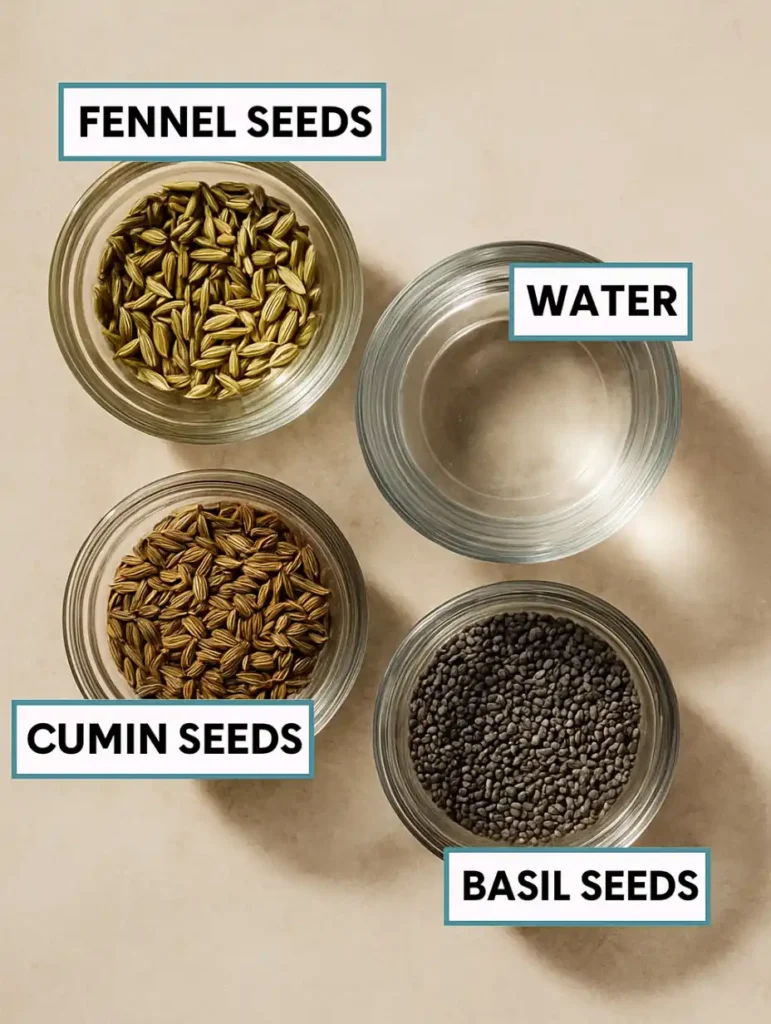Looking for a warm cup that fits a steady weight-loss routine, not a quick fix? You’re in the right place. Bariatric seed tea is a simple kitchen recipe made from everyday seeds and hot water. It isn’t a miracle drink. It’s a light infusion that may help you feel fuller, sip more fluids, and settle your stomach a bit. That’s it. No drama.
Here’s what you can expect from this guide. You’ll get clear ratios, easy steps, and two flavor paths so you can find a version that suits your taste. You’ll also see sensible tips on timing, storage, and tolerance after surgery. I keep the claims grounded and the method simple, so you can try it with confidence at home.
Had bariatric surgery? Check in with your care team before you test new drinks, especially if you take medications or you’re early in recovery. Start small, see how your body feels, and only scale up if it sits well.
Ready to make a cup that actually fits real life?
What is bariatric seed tea?
Bariatric seed tea is a light herbal-style drink made by simmering seeds in water, then straining and sipping. The typical mix includes cumin, fennel, and soaked basil seeds, though some versions also use chia, flax, or fenugreek. The seeds don’t steep for flavor alone; gel-forming fibers thicken liquids, which can help some people feel satisfied with fewer calories (Linus Pauling Institute).
This drink is often suggested after bariatric surgery as a way to stay hydrated and gently support digestion. It’s not a “fat-melting potion.” It’s simply warm water infused with seeds, offering small amounts of fiber, trace minerals, and plant compounds. Some people drink it hot like tea; others prefer it chilled.
Think of it as a kitchen homebrew: quick, inexpensive, and adaptable. The base is always the same, seeds plus water, with room to adjust strength and taste.

Bariatric Seed Tea Recipe for Weight Loss
Equipment
- Small saucepan or kettle
- Fine strainer
- Heatproof mug
- Teaspoon measure
- Jar (for cold infuse option)
Ingredients
Tea Base
- 1 teaspoon cumin seeds
- 1 teaspoon fennel seeds
- 2 1/2 cups water
- 1 teaspoon basil seeds Soak at least 15 minutes until swollen and gelled.
Optional Add-Ins
- 1 thin slice fresh ginger Adds gentle spice.
- 1 thin slice or squeeze lemon For brightness.
- 1 small pinch ground cinnamon Cozy flavor; optional.
Instructions
- Soak basil seeds in cool water for at least 15 minutes until they swell and form a gel; set aside.
- STOVETOP: Combine cumin seeds, fennel seeds, and 2 1/2 cups water in a small saucepan. Bring to a gentle boil.
- Reduce to a low simmer and cook 5–7 minutes (avoid a rolling boil to prevent bitterness).
- Strain through a fine mesh into a heatproof mug to remove seeds.
- Stir in the soaked basil seeds just before sipping. Add ginger, lemon, or cinnamon if desired.
- COLD-INFUSE OPTION: Pour just-boiled water over cumin and fennel in a jar, cover, and steep ~10 minutes. Strain, chill, then stir in soaked basil seeds when ready to drink.
- Texture tip: If too thick, let it rest so seeds settle, or strain again; sip from the top.
Notes
Nutrition
Is it right for people after bariatric surgery?
Short answer. Sometimes. Seed tea can fit many plans, but not every stage or every person.
It may be a good fit if you:
- Tolerate warm liquids without nausea
- Handle small amounts of soaked seeds without cramps or reflux
- Have the green light from your care team
- Want a gentle way to sip more fluids and feel a bit fuller
Skip it for now and talk to your team if you:
- Are in the early healing phase when your plan limits textures
- Have swallowing trouble or a history of strictures
- Take medicines where fiber gels may block absorption
- Have blood sugar concerns, bleeding disorders, or fluid restrictions
- Notice gas, cramping, chest burn, or throat tightness when you try it
Simple way to test tolerance
- Start half strength and strain out the seeds
- Sip slowly and stop at the first sign of discomfort
- Space seed tea and medicines by a few hours
- Keep plain water going through the day
Early weeks note: Skip seed tea. Stick with clear liquids approved by your team; the Mayo Clinic describes a staged plan that starts with clear liquids, then blended and soft foods before regular foods.
Not sure which stage you are in or what your program allows? Ask your clinic first, then try a small cup at home and see how you feel.
Ingredients and exact ratios

Here’s the simple, no-nonsense list. Measure them out as written for a standard single serving.
What you need
- 1 teaspoon cumin seeds
- 1 teaspoon fennel seeds
- 2½ cups water
- 1 teaspoon basil seeds, soaked in water for at least 15 minutes until they swell and form a gel
Optional add-ins
- A thin slice of fresh ginger for a little bite
- A squeeze of lemon or a thin slice of lemon for brightness
- A small pinch of cinnamon if you want a cozy flavor
Tools
- A small saucepan or kettle
- Fine strainer
- Heatproof mug
- Teaspoon measure
These amounts keep the flavor balanced. If you like a stronger drink, double the seeds but keep the water ratio so it doesn’t get too thick.
Step-by-step instructions

Making this tea is straightforward. Just follow the steps and you’ll have a warm, lightly spiced drink in minutes.
Stovetop method
- Add the cumin and fennel seeds to a small saucepan with the 2½ cups of water.
- Bring it to a gentle boil, then lower the heat and simmer for 5 to 7 minutes.
- Strain the liquid into a mug to catch the seeds.
- Stir in the soaked basil seeds just before sipping.
Cold-infuse option
- Pour just-boiled water into a jar with the cumin and fennel.
- Cover and let it steep for about 10 minutes.
- Strain, chill in the fridge, then stir in the soaked basil seeds when you’re ready to drink.
Smooth-texture tip
If the gelled seeds feel too thick, strain again through a fine mesh or let the cup rest a few minutes. Sip from the top while most of the seeds settle at the bottom.
Nutrition per serving
Here’s the breakdown for one standard mug made with the ratios listed earlier. This keeps expectations realistic, it’s a light drink, not a full meal.
- Calories: 10 kcal
- Carbohydrates: 2 g
- Fiber: 1 g
- Protein: 0 g
- Fat: 0 g
- Saturated fat: 0 g
- Unsaturated fat: 0 g
- Trans fat: 0 g
- Sugar: 0 g
- Sodium: 5 mg
- Cholesterol: 0 mg
How these numbers were estimated
These values come from standard food databases for cumin, fennel, and basil seeds in the listed amounts. Optional add-ins like lemon or ginger change the numbers only slightly. Your mug may vary depending on brand and seed freshness.
When and how much to drink
Timing matters, but there isn’t a single rule that fits everyone. Here are the most common patterns people try.
Morning vs 30 minutes before meals
Some prefer a cup in the morning to settle digestion and start hydration. Others sip it about half an hour before a meal to help with fullness. Both can work, the right choice depends on how your stomach feels at different times of day.
Daily amount and hydration notes
- Start with one cup per day.
- If it sits well, you can have up to two cups spaced out.
- Keep drinking regular water through the day to avoid dehydration; ASMBS suggests about 64 ounces of fluid daily after surgery. If you want a simple mineral sip between cups of water, try our pink salt drink.
- If you’re early after surgery, ask your care team before adding seed tea; ASMBS notes that increasing water and using fiber can help with constipation after surgery.
Taste tips and easy swaps
Not everyone likes the same flavor, and that’s fine. Here’s how to make the tea taste good without overcomplicating it.
Seed swaps
- Cumin vs ajwain: Ajwain has a sharper, more thyme-like flavor. Try it if cumin feels too earthy.
- Fennel vs anise: Fennel is sweet and mild; anise is stronger and can taste like licorice. Use sparingly if you’re new to it.
- Basil seeds vs chia: Both swell and gel; chia often thickens more because it’s higher in fiber per tablespoon about 4.1 g per Tbsp per USDA. For a thicker, dessert-like option, see our matcha chia pudding.
Sweetness and caffeine-free paths
- A few drops of lemon juice brighten the taste without adding sugar.
- If you want a hint of sweetness, try a small amount of stevia or monk fruit.
- Stick with caffeine-free add-ins, cinnamon, ginger, mint, if you’re avoiding stimulants.
Play around with these swaps until you find the cup that feels right for you.
Tolerance tips after sleeve or bypass
Every stage after surgery is different, and your stomach may handle this drink better at some times than others.
Early weeks vs later months
- First few weeks: Skip seed tea. Stick with clear liquids and whatever your care team has approved. Seeds can be rough on a healing stomach.
- Months 2 to 3: Try a weak version, simmer the cumin and fennel, but skip the soaked seeds at first. Strain well and sip slowly.
- Later months: If you’re tolerating fibrous foods, add soaked basil or chia seeds back in. Start small and build up.
Medication checks and when to stop
- Space the tea a couple of hours away from pills; MedlinePlus notes that bulk-forming fibers like psyllium can interfere with absorption and advises separating certain medicines by about three hours.
- Stop if you notice bloating, chest burn, or cramping.
- Always pause and ask your clinic if you’re unsure about safety at your stage.
Your tolerance is personal. Some people enjoy it right away, others need months before their stomach feels ready.
Storage and batch prep
Making a fresh cup every time is nice, but you can also plan ahead if you want it ready to go.
- Fridge life: Brewed seed tea without the soaked seeds will keep in the fridge for about 24 hours in a covered jar.
- Add seeds later: For the best texture, add the soaked basil or chia seeds right before drinking. Leaving them in the fridge too long makes the drink overly thick and slimy.
- Reheating: If you like it warm, reheat gently on the stove or in the microwave. Don’t let it boil again, that can dull the flavor.
- Batch tip: Double or triple the cumin and fennel boil, strain, and store the plain liquid. Then add seeds fresh for each cup, or keep a cold, make-ahead option like our blue spirulina smoothie for busy days.
This way you can keep the drink handy without ending up with a jar of jelly in your fridge.
Common mistakes and quick fixes
Even a simple recipe can go sideways. Here are the slip-ups most people run into and how to fix them fast.
- Bitterness: This happens when the cumin and fennel simmer too long or on too high heat.
Quick fix: Stick to 5 to 7 minutes on a gentle simmer, not a rolling boil. - Gritty texture: Sometimes fine bits of seed sneak through.
Quick fix: Strain through a very fine mesh or even a coffee filter. - Too thick or slimy: Adding the soaked seeds too early or letting them sit too long in the fridge can turn the tea into pudding.
Quick fix: Always stir seeds in right before you drink. - Weak flavor: Using old seeds or too much water can make the tea bland.
Quick fix: Toast seeds lightly in a dry pan before boiling, or increase the seed amounts just a touch.
A little tweak usually saves the cup, so don’t toss it out right away.
Conclusion
Bariatric seed tea isn’t magic, but it can be a steady companion if you want a light, filling drink that supports hydration and digestion. A simple mix of cumin, fennel, and basil seeds turns into a soothing cup that you can tweak with lemon, ginger, or cinnamon. It’s cheap, quick, and easy to make at home.
The key is knowing when your body is ready. If you’re fresh out of surgery, hold off until your care team says it’s fine. Once cleared, start with a small, strained portion and see how you feel. From there, adjust the strength, timing, and seeds to suit your taste.
Think of it less as a weight-loss trick and more as one small habit that keeps you on track. Sometimes, it’s these simple cups that help the most.
FAQs
1) What’s in bariatric seed tea?
It usually has cumin, fennel, and basil seeds simmered in water. Some people swap in chia, flax, or fenugreek for variety.
2) Does bariatric seed tea actually help with weight loss?
It won’t melt fat on its own. What it can do is add fiber and water, which may help you feel full and steady digestion. Think of it as a support, not a shortcut.
3) What is the 3-ingredient version, and what about a 4-ingredient option?
The simplest version is cumin, fennel, and basil seeds. A 4-ingredient option often adds lemon or ginger for extra flavor.
4) Is seed tea safe after gastric sleeve or bypass?
It depends on your stage. Skip it in the first few weeks. Later, start with just the strained liquid before adding soaked seeds. Always ask your clinic before trying new drinks.
5) When should I drink it and how much per day?
One cup a day is a good start. If you feel fine, you can go up to two. Some sip it in the morning, others before meals. The right time depends on your routine and comfort.
6) Can I swap basil seeds for chia, flax, or fenugreek?
Yes. Basil seeds are lighter, chia makes it thicker, flax adds a nutty taste, and fenugreek brings a strong earthy flavor. Try small amounts to see what feels best.













